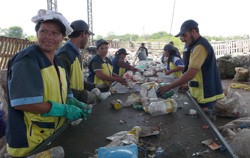
To some people, recycling boils down to merely separating recyclables from garbage to drop off into colorful bins. For the “gancheros” of Asuncion, Paraguay, recycling is a way of life.
Living in and off of landfills, gancheros, named after the large hook (or “gancho” in Spanish) of their garbage-separating poles, undertake back breaking work recycling amid the most difficult, sub-human conditions.
The metropolitan landfill located near Asuncion, which services 1.2 million people from 11 municipalities, is home to 1,200 gancheros who survive on what they scavenge and sell to formal recyclers. Men, women, and children sift through the 1,500 tons of waste deposited daily, of which 66% is organic and biodegradable, and 34% inorganic, exposed to disease born of bacteria and of toxic waste.
With the support of USAID and other foreign and Paraguayan government and private sector entities, the Procicla Project is improving living conditions for gancheros. The Municipality of Asuncion contributed land where a sorting center for recyclable waste has been established. Private recycling companies offered technical assistance, uniforms, and other specialized equipment and materials. Facilities such as shopping malls, hotels and companies are sorting their waste for recyclables and providing them directly to Procicla.
A core team of gancheros has been trained in recycling methods that brings higher levels of safety and higher earnings, both of which raise the standard of living for the several ganchero neighborhoods surrounding the landfill. Income has increased from about $5.50 to $8.50 per day, while the average work day has decreased from 12 hours to 8. Children can now go to school, and a local NGO has donated music instruments and classes. In addition, the community created a cooperative, now with 150 ganchero members, to provide loans, education and solidarity. By leveraging their experience into other arenas (such as providing cleaning services to companies), the gancheros are even making a transition from an informal and individual recycling process to a business oriented model.







Comment
Make a general inquiry or suggest an improvement.